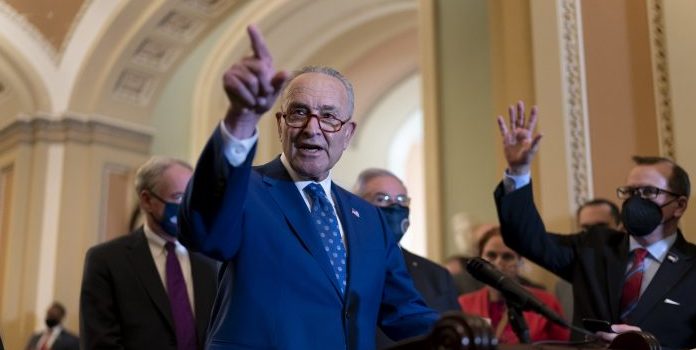(The so-called Inflation Reduction Act passed the U.S. Senate on Sunday, and while the vote led to Democrats celebrating, their comments focused on other aspects of the $740 billion spending bill.
Senate Majority Leader Chuck Schumer, D-N.Y., said the bill lowers costs for Americans, but it also creates millions of jobs and represents the “boldest” step the country has taken to address climate change.
“This bill is what the American people want,” Schumer tweeted.
Senators voted on party lines, 50-50, and Vice President Kamala Harris cast the tie-breaking vote. It now heads to the House, which is expected to take up the bill later this week.
New York Gov. Kathy Hochul, a former House member, called on the chamber to pass the bill, which came primarily through negotiations between Schumer and Sen. Joe Manchin, D-W. Va.
“The compromise legislation makes critical investments to address the climate crisis through investments that will lower utility costs for everyday New Yorkers and spur renewable energy production needed to meet our emission reduction goals,” Hochul claimed in a statement. “Under this legislation, New Yorkers will also see lower health care costs and an extension of critical subsidies to ensure insurance remains affordable.”
Generic pharmaceuticals companies have said that the bill’s health care component—much like its other aspects—will actually inflict even more pain on consumers.
An independent analysis by the nonpartisan Penn Wharton Budget Model found that the bill has a “statistically indistinguishable from zero” effect on inflation.
New York Republican congressional delegation members also wonder whether the time is right for another large spending bill.
“In the midst of the Biden Recession, House Democrats are determined to pass their Inflation Expansion Act, which will WORSEN inflation, INCREASE taxes, and CUT jobs,” U.S. House Republican Conference Chairwoman Elise Stefanik tweeted Monday.
According to the Joint Committee on Taxation, the bill creates $313 billion by creating a 15% minimum tax on corporations that report annual incomes of at least $1 billion to shareholders. The Congressional Budget Office estimates another $124 billion would be generated through the Internal Revenue Service.
That provision concerns U.S. Rep. Lee Zeldin, the Long Island Republican who faces Hochul in this year’s gubernatorial election.
“At a time when Americans are already struggling to make ends meet faced with crushing costs of 40-year high inflation, Democrats choosing to beef up the IRS to poke and prod the finances of those Americans has to be one of the dumbest ideas yet from one-party Dem rule in DC,” Zeldin tweeted Monday.

